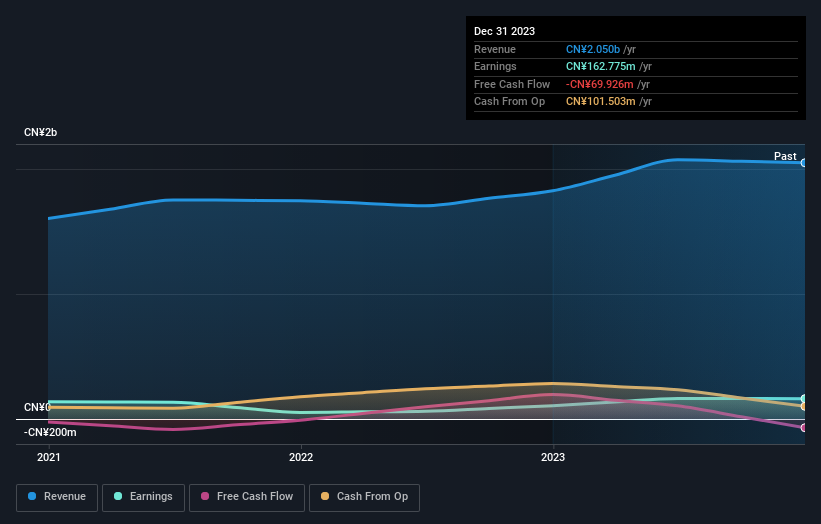
Key Insights
- Significant insider control over Zhongzhi Pharmaceutical Holdings implies vested interests in company growth
- The largest shareholder of the company is Zhi Tian Lai with a 60% stake
- Using data from company's past performance alongside ownership research, one can better assess the future performance of a company
A look at the shareholders of Zhongzhi Pharmaceutical Holdings Limited (HKG:3737) can tell us which group is most powerful. We can see that individual insiders own the lion's share in the company with 66% ownership. Put another way, the group faces the maximum upside potential (or downside risk).
As a result, insiders were the biggest beneficiaries of last week’s 10.0% gain.
Let's delve deeper into each type of owner of Zhongzhi Pharmaceutical Holdings, beginning with the chart below.
View our latest analysis for Zhongzhi Pharmaceutical Holdings

What Does The Lack Of Institutional Ownership Tell Us About Zhongzhi Pharmaceutical Holdings?
Institutional investors often avoid companies that are too small, too illiquid or too risky for their tastes. But it's unusual to see larger companies without any institutional investors.
There are multiple explanations for why institutions don't own a stock. The most common is that the company is too small relative to funds under management, so the institution does not bother to look closely at the company. On the other hand, it's always possible that professional investors are avoiding a company because they don't think it's the best place for their money. Zhongzhi Pharmaceutical Holdings' earnings and revenue track record (below) may not be compelling to institutional investors -- or they simply might not have looked at the business closely.

We note that hedge funds don't have a meaningful investment in Zhongzhi Pharmaceutical Holdings. Because actions speak louder than words, we consider it a good sign when insiders own a significant stake in a company. In Zhongzhi Pharmaceutical Holdings' case, its Top Key Executive, Zhi Tian Lai, is the largest shareholder, holding 60% of shares outstanding. In comparison, the second and third largest shareholders hold about 9.5% and 4.9% of the stock. Interestingly, the third-largest shareholder, Li Xia Jiang is also a Member of the Board of Directors, again, indicating strong insider ownership amongst the company's top shareholders. Additionally, the company's CEO Ying Feng Lai directly holds 0.7% of the total shares outstanding.
While studying institutional ownership for a company can add value to your research, it is also a good practice to research analyst recommendations to get a deeper understand of a stock's expected performance. As far as we can tell there isn't analyst coverage of the company, so it is probably flying under the radar.
Insider Ownership Of Zhongzhi Pharmaceutical Holdings
The definition of company insiders can be subjective and does vary between jurisdictions. Our data reflects individual insiders, capturing board members at the very least. Management ultimately answers to the board. However, it is not uncommon for managers to be executive board members, especially if they are a founder or the CEO.
I generally consider insider ownership to be a good thing. However, on some occasions it makes it more difficult for other shareholders to hold the board accountable for decisions.
Our information suggests that insiders own more than half of Zhongzhi Pharmaceutical Holdings Limited. This gives them effective control of the company. So they have a HK$694m stake in this HK$1.0b business. Most would argue this is a positive, showing strong alignment with shareholders. You can click here to see if those insiders have been buying or selling.
General Public Ownership
The general public-- including retail investors -- own 24% stake in the company, and hence can't easily be ignored. This size of ownership, while considerable, may not be enough to change company policy if the decision is not in sync with other large shareholders.
Private Equity Ownership
With a stake of 9.5%, private equity firms could influence the Zhongzhi Pharmaceutical Holdings board. Some investors might be encouraged by this, since private equity are sometimes able to encourage strategies that help the market see the value in the company. Alternatively, those holders might be exiting the investment after taking it public.
Next Steps:
It's always worth thinking about the different groups who own shares in a company. But to understand Zhongzhi Pharmaceutical Holdings better, we need to consider many other factors. Take risks for example - Zhongzhi Pharmaceutical Holdings has 2 warning signs (and 1 which is significant) we think you should know about.
If you would prefer check out another company -- one with potentially superior financials -- then do not miss this free list of interesting companies, backed by strong financial data.
NB: Figures in this article are calculated using data from the last twelve months, which refer to the 12-month period ending on the last date of the month the financial statement is dated. This may not be consistent with full year annual report figures.
Have feedback on this article? Concerned about the content? Get in touch with us directly. Alternatively, email editorial-team (at) simplywallst.com.
This article by Simply Wall St is general in nature. We provide commentary based on historical data and analyst forecasts only using an unbiased methodology and our articles are not intended to be financial advice. It does not constitute a recommendation to buy or sell any stock, and does not take account of your objectives, or your financial situation. We aim to bring you long-term focused analysis driven by fundamental data. Note that our analysis may not factor in the latest price-sensitive company announcements or qualitative material. Simply Wall St has no position in any stocks mentioned.
Have feedback on this article? Concerned about the content? Get in touch with us directly. Alternatively, email editorial-team@simplywallst.com